Critical Evaluation of HRM Theories and Frameworks
VerifiedAdded on 2023/03/21
|8
|2074
|88
AI Summary
This report provides a critical evaluation of various HRM theories and frameworks to assess their fundamental assumptions, intellectual rigor, and practical value. It also discusses the role and range of competencies of HRM practitioners and other managers of people in various organizational settings.
Contribute Materials
Your contribution can guide someone’s learning journey. Share your
documents today.
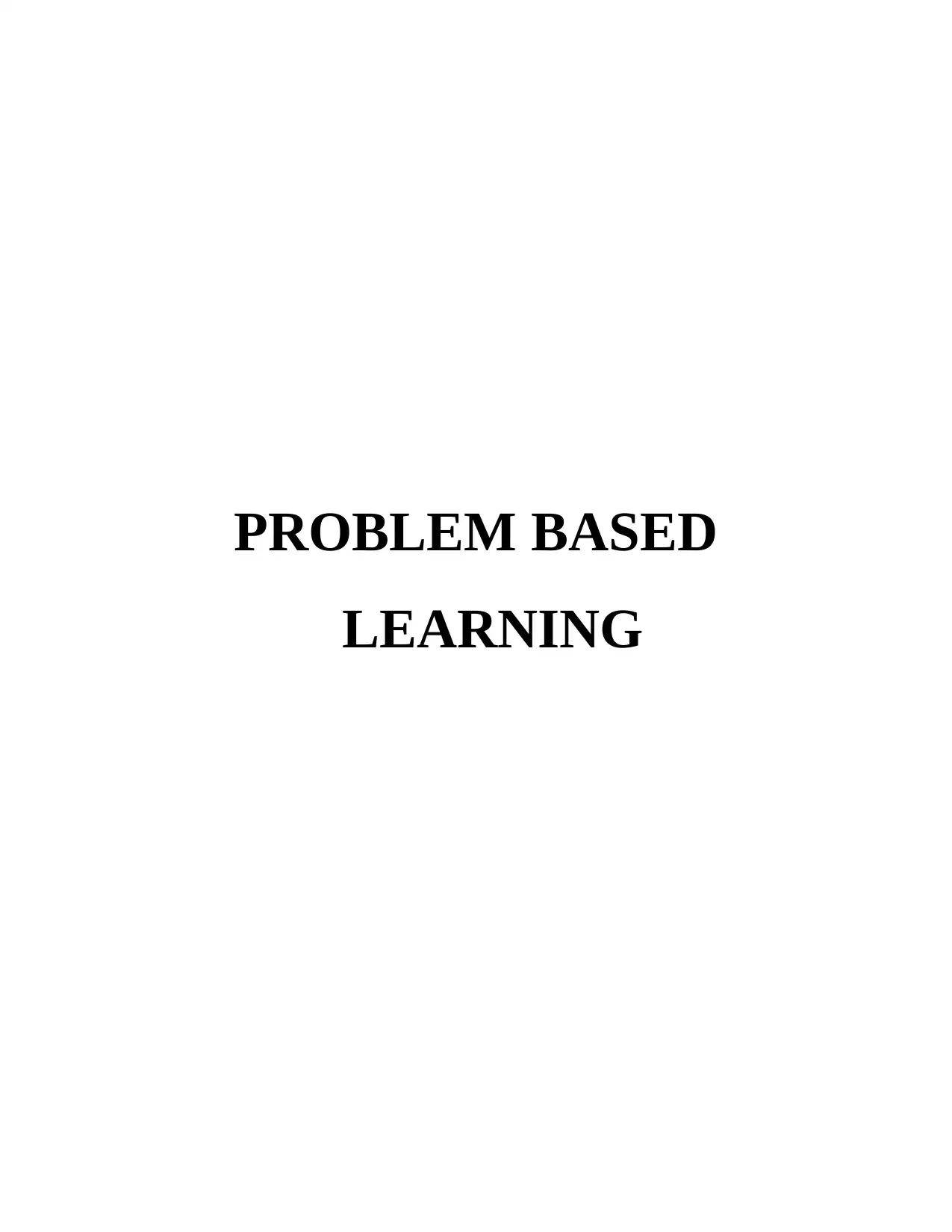
PROBLEM BASED
LEARNING
LEARNING
Secure Best Marks with AI Grader
Need help grading? Try our AI Grader for instant feedback on your assignments.
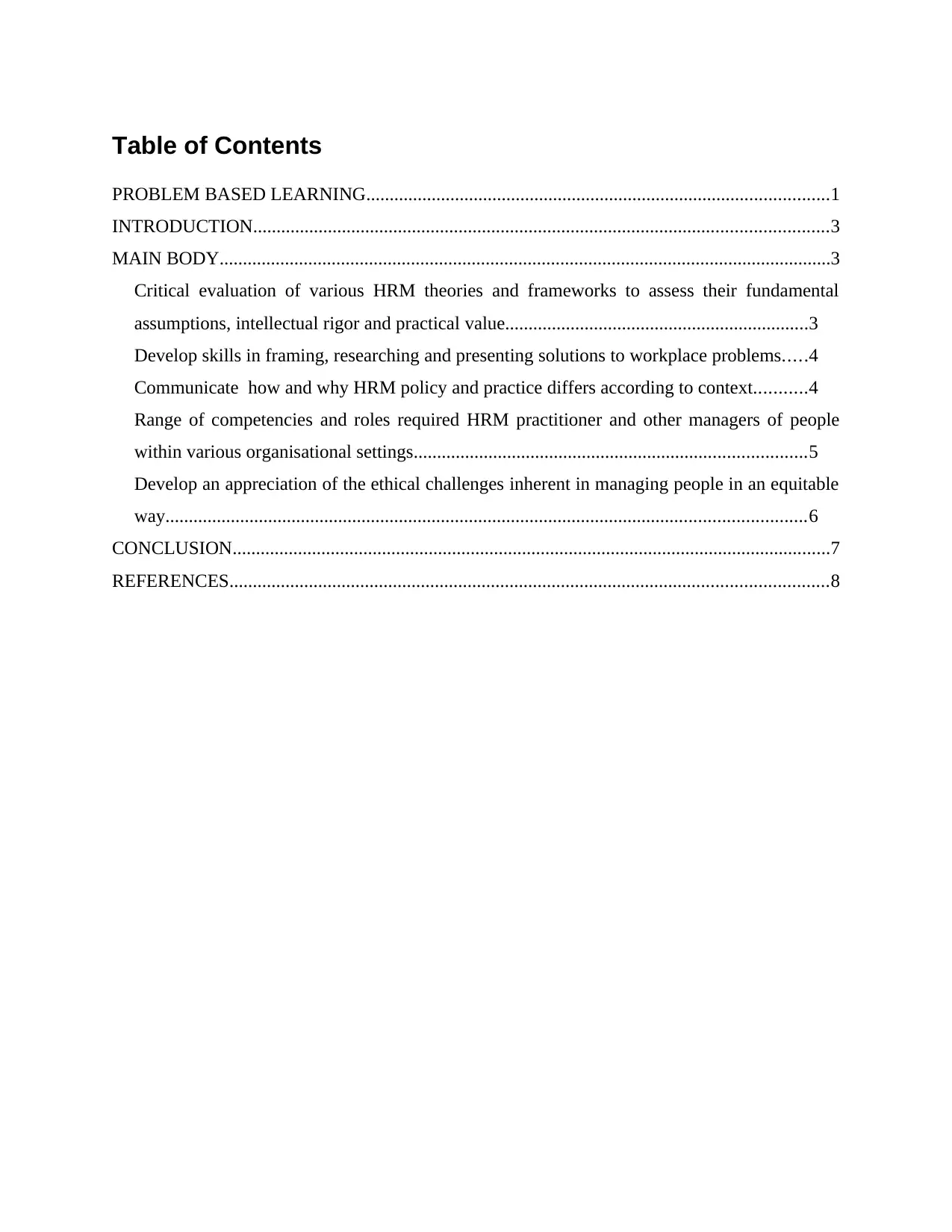
Table of Contents
PROBLEM BASED LEARNING...................................................................................................1
INTRODUCTION...........................................................................................................................3
MAIN BODY...................................................................................................................................3
Critical evaluation of various HRM theories and frameworks to assess their fundamental
assumptions, intellectual rigor and practical value.................................................................3
Develop skills in framing, researching and presenting solutions to workplace problems.....4
Communicate how and why HRM policy and practice differs according to context...........4
Range of competencies and roles required HRM practitioner and other managers of people
within various organisational settings....................................................................................5
Develop an appreciation of the ethical challenges inherent in managing people in an equitable
way.........................................................................................................................................6
CONCLUSION................................................................................................................................7
REFERENCES................................................................................................................................8
PROBLEM BASED LEARNING...................................................................................................1
INTRODUCTION...........................................................................................................................3
MAIN BODY...................................................................................................................................3
Critical evaluation of various HRM theories and frameworks to assess their fundamental
assumptions, intellectual rigor and practical value.................................................................3
Develop skills in framing, researching and presenting solutions to workplace problems.....4
Communicate how and why HRM policy and practice differs according to context...........4
Range of competencies and roles required HRM practitioner and other managers of people
within various organisational settings....................................................................................5
Develop an appreciation of the ethical challenges inherent in managing people in an equitable
way.........................................................................................................................................6
CONCLUSION................................................................................................................................7
REFERENCES................................................................................................................................8
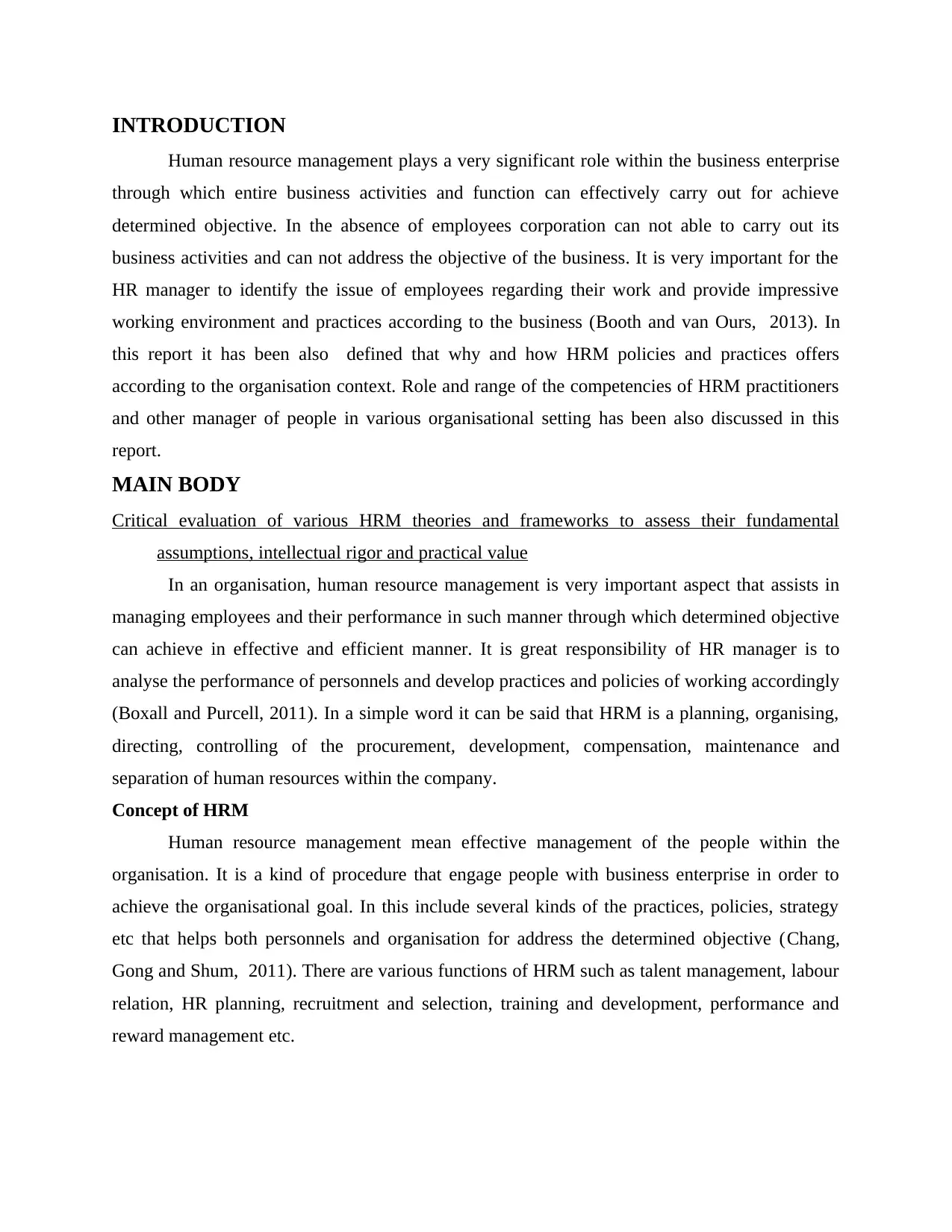
INTRODUCTION
Human resource management plays a very significant role within the business enterprise
through which entire business activities and function can effectively carry out for achieve
determined objective. In the absence of employees corporation can not able to carry out its
business activities and can not address the objective of the business. It is very important for the
HR manager to identify the issue of employees regarding their work and provide impressive
working environment and practices according to the business (Booth and van Ours, 2013). In
this report it has been also defined that why and how HRM policies and practices offers
according to the organisation context. Role and range of the competencies of HRM practitioners
and other manager of people in various organisational setting has been also discussed in this
report.
MAIN BODY
Critical evaluation of various HRM theories and frameworks to assess their fundamental
assumptions, intellectual rigor and practical value
In an organisation, human resource management is very important aspect that assists in
managing employees and their performance in such manner through which determined objective
can achieve in effective and efficient manner. It is great responsibility of HR manager is to
analyse the performance of personnels and develop practices and policies of working accordingly
(Boxall and Purcell, 2011). In a simple word it can be said that HRM is a planning, organising,
directing, controlling of the procurement, development, compensation, maintenance and
separation of human resources within the company.
Concept of HRM
Human resource management mean effective management of the people within the
organisation. It is a kind of procedure that engage people with business enterprise in order to
achieve the organisational goal. In this include several kinds of the practices, policies, strategy
etc that helps both personnels and organisation for address the determined objective (Chang,
Gong and Shum, 2011). There are various functions of HRM such as talent management, labour
relation, HR planning, recruitment and selection, training and development, performance and
reward management etc.
Human resource management plays a very significant role within the business enterprise
through which entire business activities and function can effectively carry out for achieve
determined objective. In the absence of employees corporation can not able to carry out its
business activities and can not address the objective of the business. It is very important for the
HR manager to identify the issue of employees regarding their work and provide impressive
working environment and practices according to the business (Booth and van Ours, 2013). In
this report it has been also defined that why and how HRM policies and practices offers
according to the organisation context. Role and range of the competencies of HRM practitioners
and other manager of people in various organisational setting has been also discussed in this
report.
MAIN BODY
Critical evaluation of various HRM theories and frameworks to assess their fundamental
assumptions, intellectual rigor and practical value
In an organisation, human resource management is very important aspect that assists in
managing employees and their performance in such manner through which determined objective
can achieve in effective and efficient manner. It is great responsibility of HR manager is to
analyse the performance of personnels and develop practices and policies of working accordingly
(Boxall and Purcell, 2011). In a simple word it can be said that HRM is a planning, organising,
directing, controlling of the procurement, development, compensation, maintenance and
separation of human resources within the company.
Concept of HRM
Human resource management mean effective management of the people within the
organisation. It is a kind of procedure that engage people with business enterprise in order to
achieve the organisational goal. In this include several kinds of the practices, policies, strategy
etc that helps both personnels and organisation for address the determined objective (Chang,
Gong and Shum, 2011). There are various functions of HRM such as talent management, labour
relation, HR planning, recruitment and selection, training and development, performance and
reward management etc.
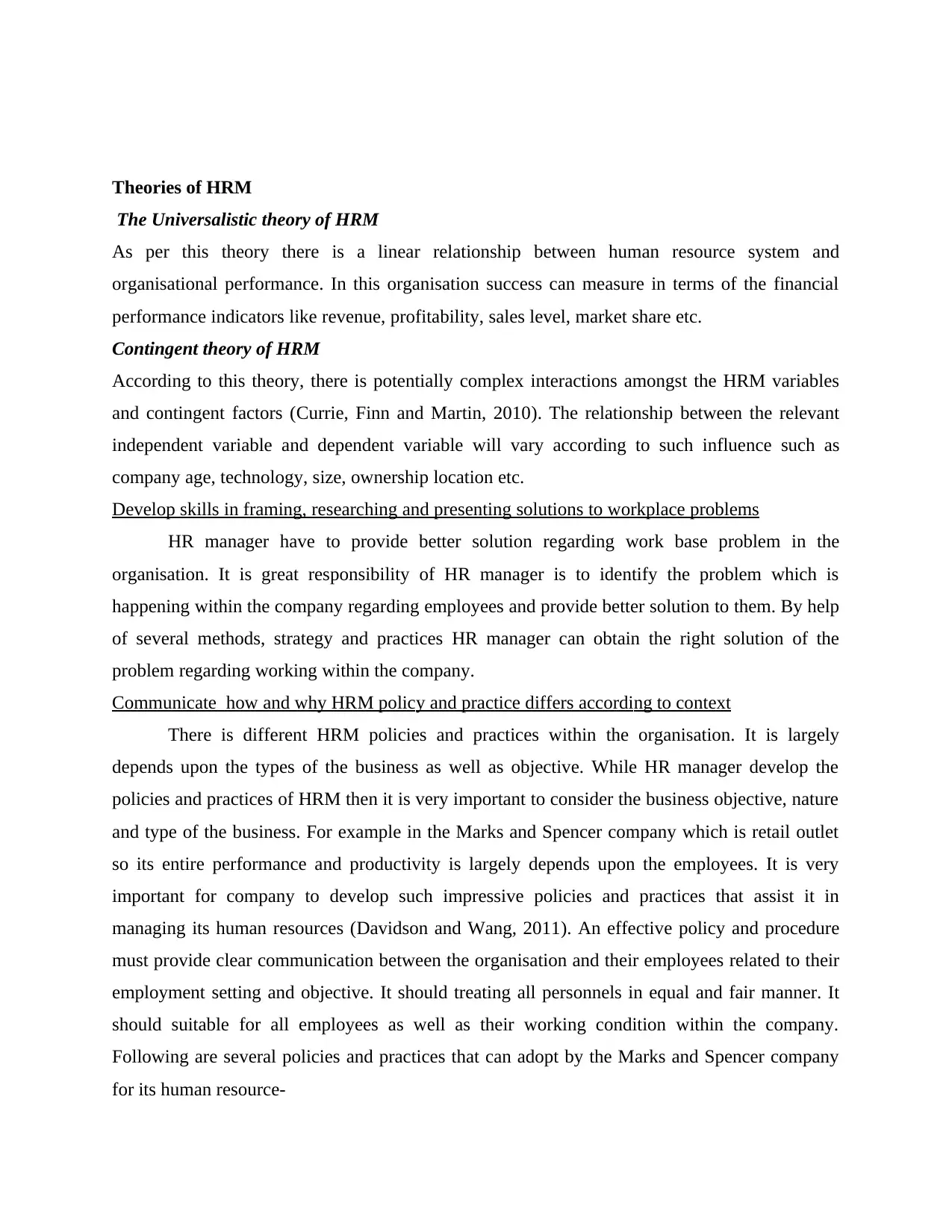
Theories of HRM
The Universalistic theory of HRM
As per this theory there is a linear relationship between human resource system and
organisational performance. In this organisation success can measure in terms of the financial
performance indicators like revenue, profitability, sales level, market share etc.
Contingent theory of HRM
According to this theory, there is potentially complex interactions amongst the HRM variables
and contingent factors (Currie, Finn and Martin, 2010). The relationship between the relevant
independent variable and dependent variable will vary according to such influence such as
company age, technology, size, ownership location etc.
Develop skills in framing, researching and presenting solutions to workplace problems
HR manager have to provide better solution regarding work base problem in the
organisation. It is great responsibility of HR manager is to identify the problem which is
happening within the company regarding employees and provide better solution to them. By help
of several methods, strategy and practices HR manager can obtain the right solution of the
problem regarding working within the company.
Communicate how and why HRM policy and practice differs according to context
There is different HRM policies and practices within the organisation. It is largely
depends upon the types of the business as well as objective. While HR manager develop the
policies and practices of HRM then it is very important to consider the business objective, nature
and type of the business. For example in the Marks and Spencer company which is retail outlet
so its entire performance and productivity is largely depends upon the employees. It is very
important for company to develop such impressive policies and practices that assist it in
managing its human resources (Davidson and Wang, 2011). An effective policy and procedure
must provide clear communication between the organisation and their employees related to their
employment setting and objective. It should treating all personnels in equal and fair manner. It
should suitable for all employees as well as their working condition within the company.
Following are several policies and practices that can adopt by the Marks and Spencer company
for its human resource-
The Universalistic theory of HRM
As per this theory there is a linear relationship between human resource system and
organisational performance. In this organisation success can measure in terms of the financial
performance indicators like revenue, profitability, sales level, market share etc.
Contingent theory of HRM
According to this theory, there is potentially complex interactions amongst the HRM variables
and contingent factors (Currie, Finn and Martin, 2010). The relationship between the relevant
independent variable and dependent variable will vary according to such influence such as
company age, technology, size, ownership location etc.
Develop skills in framing, researching and presenting solutions to workplace problems
HR manager have to provide better solution regarding work base problem in the
organisation. It is great responsibility of HR manager is to identify the problem which is
happening within the company regarding employees and provide better solution to them. By help
of several methods, strategy and practices HR manager can obtain the right solution of the
problem regarding working within the company.
Communicate how and why HRM policy and practice differs according to context
There is different HRM policies and practices within the organisation. It is largely
depends upon the types of the business as well as objective. While HR manager develop the
policies and practices of HRM then it is very important to consider the business objective, nature
and type of the business. For example in the Marks and Spencer company which is retail outlet
so its entire performance and productivity is largely depends upon the employees. It is very
important for company to develop such impressive policies and practices that assist it in
managing its human resources (Davidson and Wang, 2011). An effective policy and procedure
must provide clear communication between the organisation and their employees related to their
employment setting and objective. It should treating all personnels in equal and fair manner. It
should suitable for all employees as well as their working condition within the company.
Following are several policies and practices that can adopt by the Marks and Spencer company
for its human resource-
Secure Best Marks with AI Grader
Need help grading? Try our AI Grader for instant feedback on your assignments.
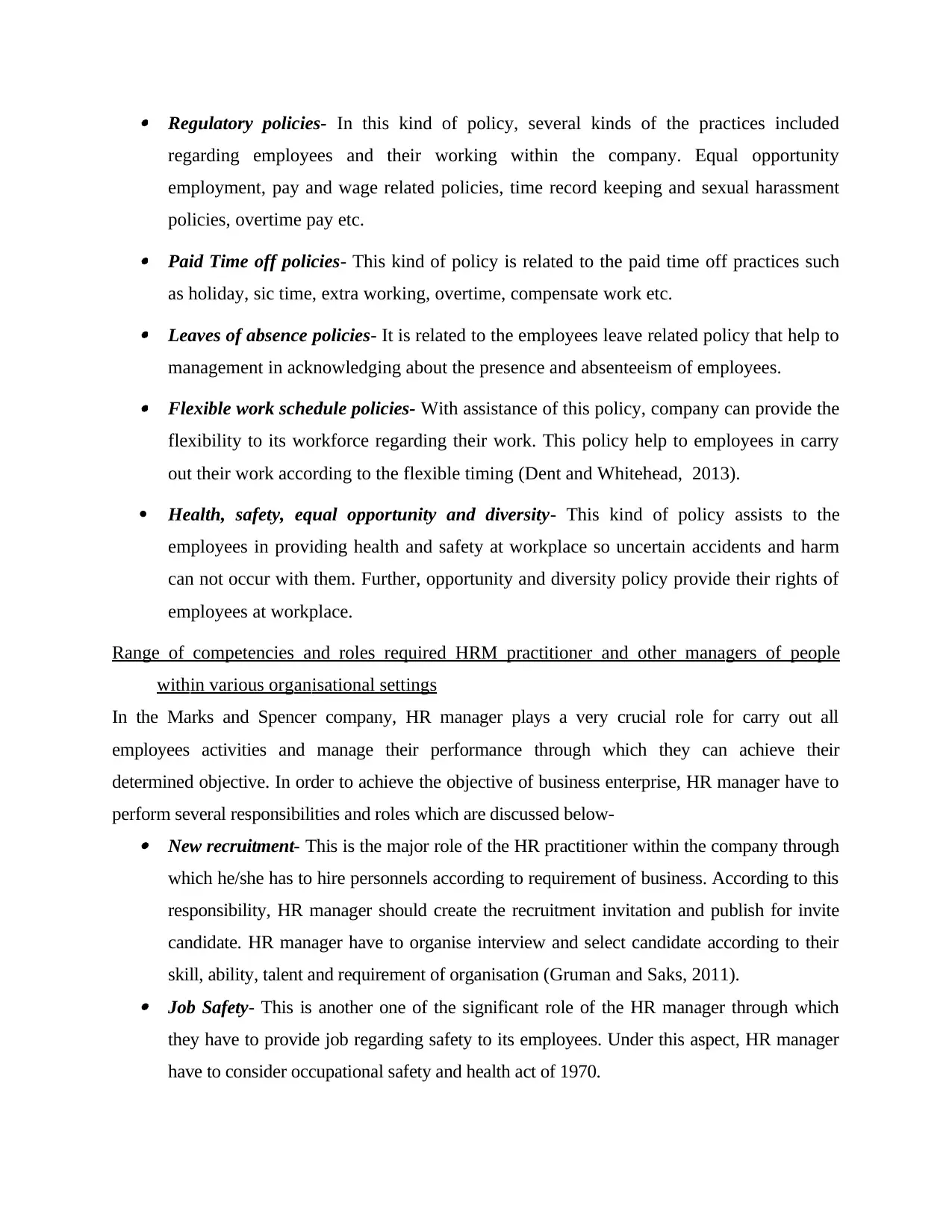
Regulatory policies- In this kind of policy, several kinds of the practices included
regarding employees and their working within the company. Equal opportunity
employment, pay and wage related policies, time record keeping and sexual harassment
policies, overtime pay etc. Paid Time off policies- This kind of policy is related to the paid time off practices such
as holiday, sic time, extra working, overtime, compensate work etc. Leaves of absence policies- It is related to the employees leave related policy that help to
management in acknowledging about the presence and absenteeism of employees. Flexible work schedule policies- With assistance of this policy, company can provide the
flexibility to its workforce regarding their work. This policy help to employees in carry
out their work according to the flexible timing (Dent and Whitehead, 2013).
Health, safety, equal opportunity and diversity- This kind of policy assists to the
employees in providing health and safety at workplace so uncertain accidents and harm
can not occur with them. Further, opportunity and diversity policy provide their rights of
employees at workplace.
Range of competencies and roles required HRM practitioner and other managers of people
within various organisational settings
In the Marks and Spencer company, HR manager plays a very crucial role for carry out all
employees activities and manage their performance through which they can achieve their
determined objective. In order to achieve the objective of business enterprise, HR manager have to
perform several responsibilities and roles which are discussed below- New recruitment- This is the major role of the HR practitioner within the company through
which he/she has to hire personnels according to requirement of business. According to this
responsibility, HR manager should create the recruitment invitation and publish for invite
candidate. HR manager have to organise interview and select candidate according to their
skill, ability, talent and requirement of organisation (Gruman and Saks, 2011). Job Safety- This is another one of the significant role of the HR manager through which
they have to provide job regarding safety to its employees. Under this aspect, HR manager
have to consider occupational safety and health act of 1970.
regarding employees and their working within the company. Equal opportunity
employment, pay and wage related policies, time record keeping and sexual harassment
policies, overtime pay etc. Paid Time off policies- This kind of policy is related to the paid time off practices such
as holiday, sic time, extra working, overtime, compensate work etc. Leaves of absence policies- It is related to the employees leave related policy that help to
management in acknowledging about the presence and absenteeism of employees. Flexible work schedule policies- With assistance of this policy, company can provide the
flexibility to its workforce regarding their work. This policy help to employees in carry
out their work according to the flexible timing (Dent and Whitehead, 2013).
Health, safety, equal opportunity and diversity- This kind of policy assists to the
employees in providing health and safety at workplace so uncertain accidents and harm
can not occur with them. Further, opportunity and diversity policy provide their rights of
employees at workplace.
Range of competencies and roles required HRM practitioner and other managers of people
within various organisational settings
In the Marks and Spencer company, HR manager plays a very crucial role for carry out all
employees activities and manage their performance through which they can achieve their
determined objective. In order to achieve the objective of business enterprise, HR manager have to
perform several responsibilities and roles which are discussed below- New recruitment- This is the major role of the HR practitioner within the company through
which he/she has to hire personnels according to requirement of business. According to this
responsibility, HR manager should create the recruitment invitation and publish for invite
candidate. HR manager have to organise interview and select candidate according to their
skill, ability, talent and requirement of organisation (Gruman and Saks, 2011). Job Safety- This is another one of the significant role of the HR manager through which
they have to provide job regarding safety to its employees. Under this aspect, HR manager
have to consider occupational safety and health act of 1970.
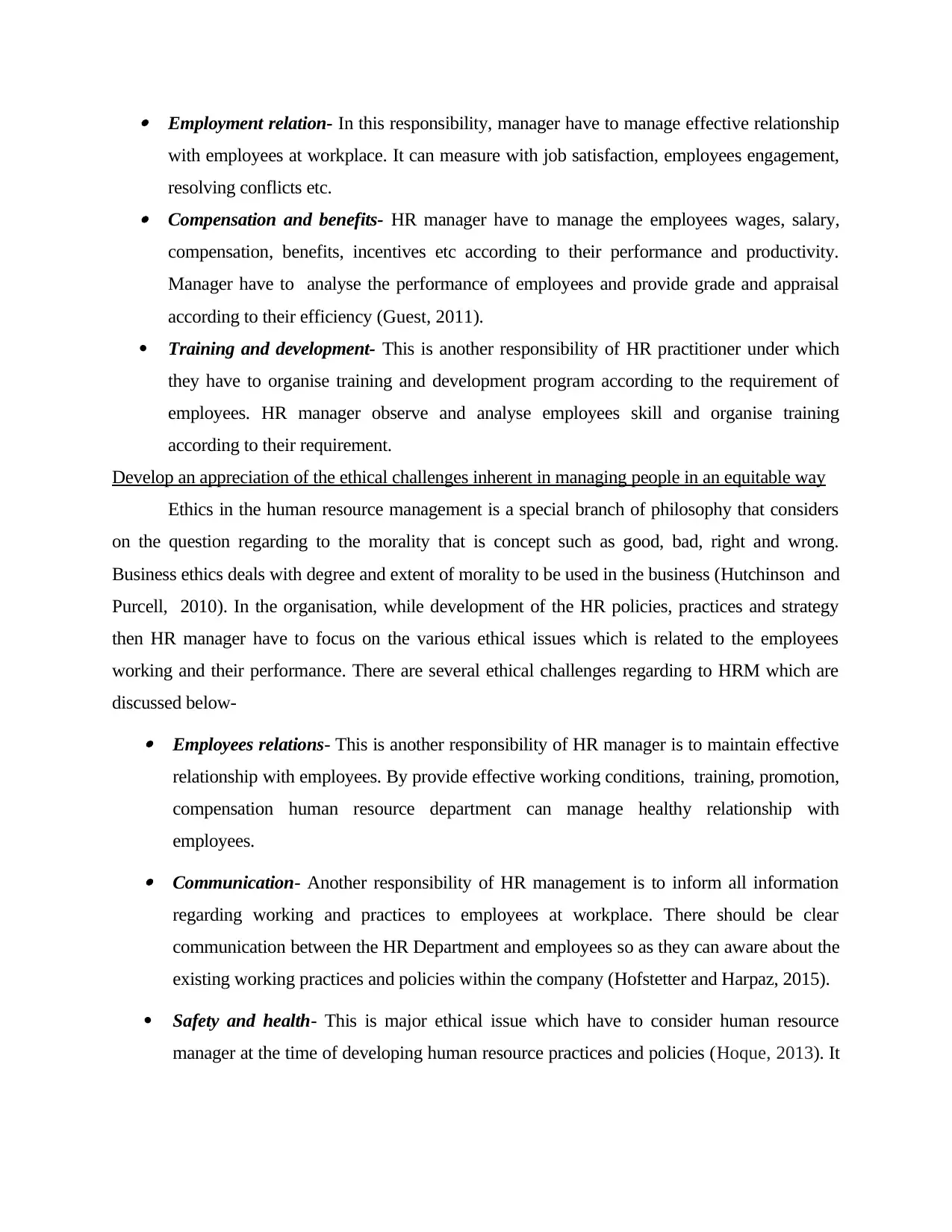
Employment relation- In this responsibility, manager have to manage effective relationship
with employees at workplace. It can measure with job satisfaction, employees engagement,
resolving conflicts etc. Compensation and benefits- HR manager have to manage the employees wages, salary,
compensation, benefits, incentives etc according to their performance and productivity.
Manager have to analyse the performance of employees and provide grade and appraisal
according to their efficiency (Guest, 2011).
Training and development- This is another responsibility of HR practitioner under which
they have to organise training and development program according to the requirement of
employees. HR manager observe and analyse employees skill and organise training
according to their requirement.
Develop an appreciation of the ethical challenges inherent in managing people in an equitable way
Ethics in the human resource management is a special branch of philosophy that considers
on the question regarding to the morality that is concept such as good, bad, right and wrong.
Business ethics deals with degree and extent of morality to be used in the business (Hutchinson and
Purcell, 2010). In the organisation, while development of the HR policies, practices and strategy
then HR manager have to focus on the various ethical issues which is related to the employees
working and their performance. There are several ethical challenges regarding to HRM which are
discussed below- Employees relations- This is another responsibility of HR manager is to maintain effective
relationship with employees. By provide effective working conditions, training, promotion,
compensation human resource department can manage healthy relationship with
employees. Communication- Another responsibility of HR management is to inform all information
regarding working and practices to employees at workplace. There should be clear
communication between the HR Department and employees so as they can aware about the
existing working practices and policies within the company (Hofstetter and Harpaz, 2015).
Safety and health- This is major ethical issue which have to consider human resource
manager at the time of developing human resource practices and policies (Hoque, 2013). It
with employees at workplace. It can measure with job satisfaction, employees engagement,
resolving conflicts etc. Compensation and benefits- HR manager have to manage the employees wages, salary,
compensation, benefits, incentives etc according to their performance and productivity.
Manager have to analyse the performance of employees and provide grade and appraisal
according to their efficiency (Guest, 2011).
Training and development- This is another responsibility of HR practitioner under which
they have to organise training and development program according to the requirement of
employees. HR manager observe and analyse employees skill and organise training
according to their requirement.
Develop an appreciation of the ethical challenges inherent in managing people in an equitable way
Ethics in the human resource management is a special branch of philosophy that considers
on the question regarding to the morality that is concept such as good, bad, right and wrong.
Business ethics deals with degree and extent of morality to be used in the business (Hutchinson and
Purcell, 2010). In the organisation, while development of the HR policies, practices and strategy
then HR manager have to focus on the various ethical issues which is related to the employees
working and their performance. There are several ethical challenges regarding to HRM which are
discussed below- Employees relations- This is another responsibility of HR manager is to maintain effective
relationship with employees. By provide effective working conditions, training, promotion,
compensation human resource department can manage healthy relationship with
employees. Communication- Another responsibility of HR management is to inform all information
regarding working and practices to employees at workplace. There should be clear
communication between the HR Department and employees so as they can aware about the
existing working practices and policies within the company (Hofstetter and Harpaz, 2015).
Safety and health- This is major ethical issue which have to consider human resource
manager at the time of developing human resource practices and policies (Hoque, 2013). It
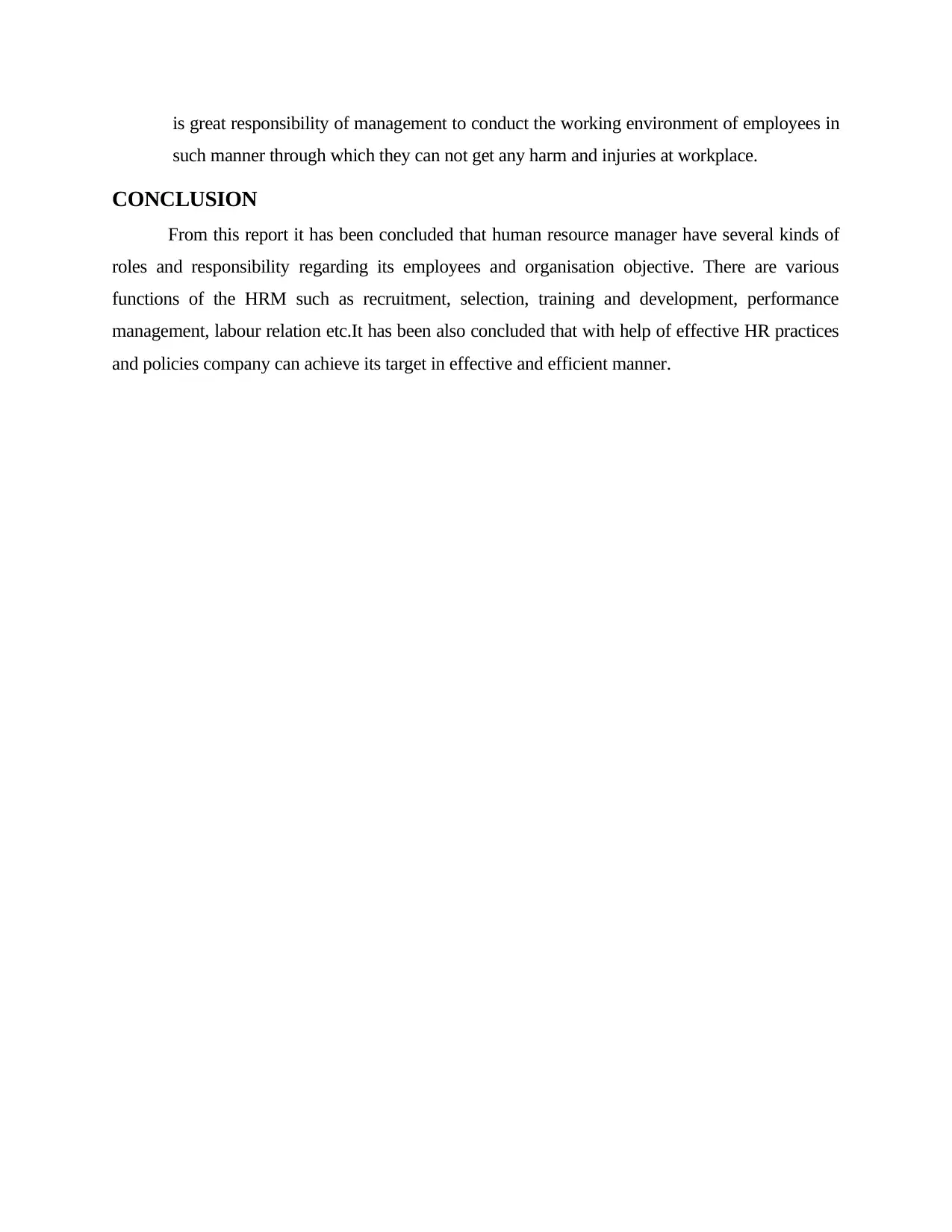
is great responsibility of management to conduct the working environment of employees in
such manner through which they can not get any harm and injuries at workplace.
CONCLUSION
From this report it has been concluded that human resource manager have several kinds of
roles and responsibility regarding its employees and organisation objective. There are various
functions of the HRM such as recruitment, selection, training and development, performance
management, labour relation etc.It has been also concluded that with help of effective HR practices
and policies company can achieve its target in effective and efficient manner.
such manner through which they can not get any harm and injuries at workplace.
CONCLUSION
From this report it has been concluded that human resource manager have several kinds of
roles and responsibility regarding its employees and organisation objective. There are various
functions of the HRM such as recruitment, selection, training and development, performance
management, labour relation etc.It has been also concluded that with help of effective HR practices
and policies company can achieve its target in effective and efficient manner.
Paraphrase This Document
Need a fresh take? Get an instant paraphrase of this document with our AI Paraphraser
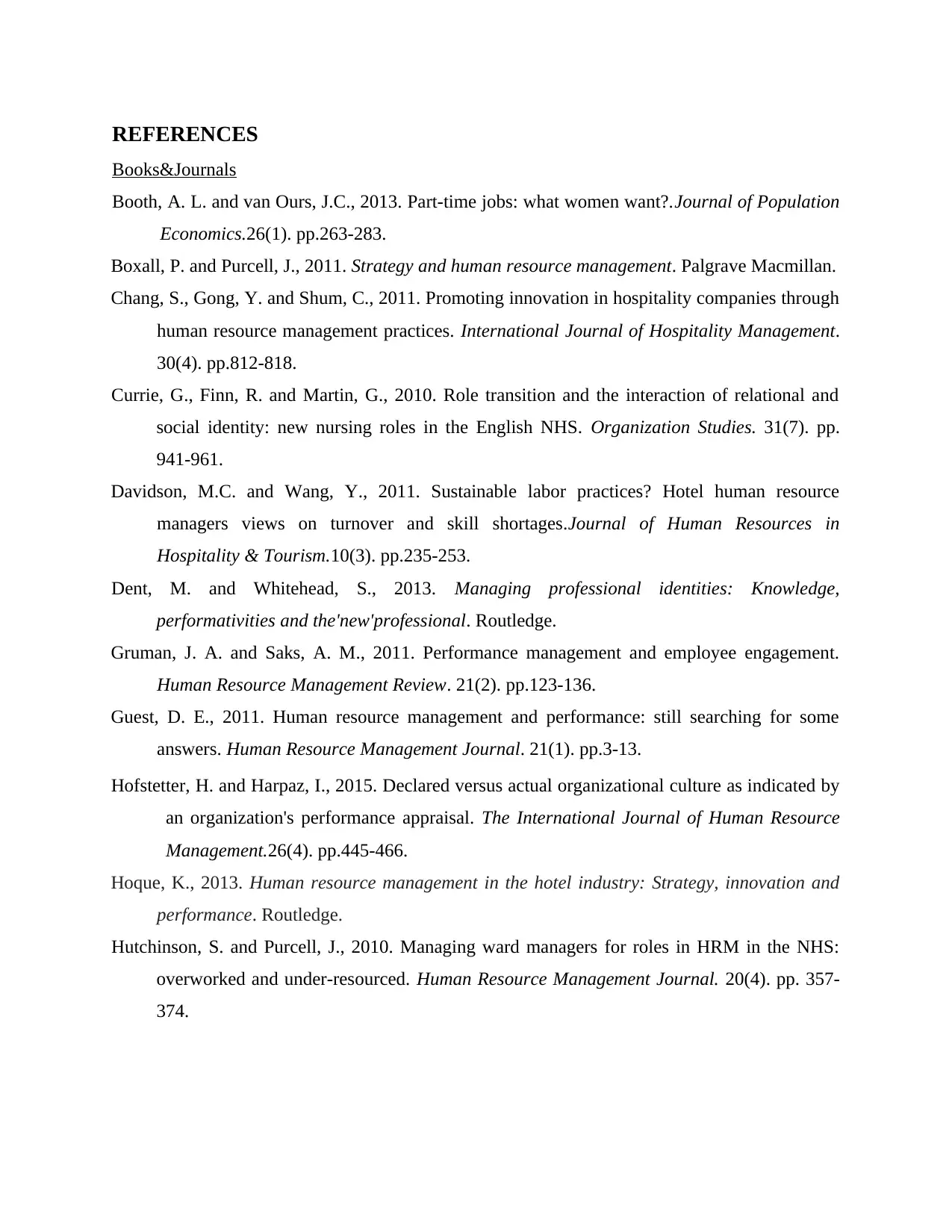
REFERENCES
Books&Journals
Booth, A. L. and van Ours, J.C., 2013. Part-time jobs: what women want?.Journal of Population
Economics.26(1). pp.263-283.
Boxall, P. and Purcell, J., 2011. Strategy and human resource management. Palgrave Macmillan.
Chang, S., Gong, Y. and Shum, C., 2011. Promoting innovation in hospitality companies through
human resource management practices. International Journal of Hospitality Management.
30(4). pp.812-818.
Currie, G., Finn, R. and Martin, G., 2010. Role transition and the interaction of relational and
social identity: new nursing roles in the English NHS. Organization Studies. 31(7). pp.
941-961.
Davidson, M.C. and Wang, Y., 2011. Sustainable labor practices? Hotel human resource
managers views on turnover and skill shortages.Journal of Human Resources in
Hospitality & Tourism.10(3). pp.235-253.
Dent, M. and Whitehead, S., 2013. Managing professional identities: Knowledge,
performativities and the'new'professional. Routledge.
Gruman, J. A. and Saks, A. M., 2011. Performance management and employee engagement.
Human Resource Management Review. 21(2). pp.123-136.
Guest, D. E., 2011. Human resource management and performance: still searching for some
answers. Human Resource Management Journal. 21(1). pp.3-13.
Hofstetter, H. and Harpaz, I., 2015. Declared versus actual organizational culture as indicated by
an organization's performance appraisal. The International Journal of Human Resource
Management.26(4). pp.445-466.
Hoque, K., 2013. Human resource management in the hotel industry: Strategy, innovation and
performance. Routledge.
Hutchinson, S. and Purcell, J., 2010. Managing ward managers for roles in HRM in the NHS:
overworked and under‐resourced. Human Resource Management Journal. 20(4). pp. 357-
374.
Books&Journals
Booth, A. L. and van Ours, J.C., 2013. Part-time jobs: what women want?.Journal of Population
Economics.26(1). pp.263-283.
Boxall, P. and Purcell, J., 2011. Strategy and human resource management. Palgrave Macmillan.
Chang, S., Gong, Y. and Shum, C., 2011. Promoting innovation in hospitality companies through
human resource management practices. International Journal of Hospitality Management.
30(4). pp.812-818.
Currie, G., Finn, R. and Martin, G., 2010. Role transition and the interaction of relational and
social identity: new nursing roles in the English NHS. Organization Studies. 31(7). pp.
941-961.
Davidson, M.C. and Wang, Y., 2011. Sustainable labor practices? Hotel human resource
managers views on turnover and skill shortages.Journal of Human Resources in
Hospitality & Tourism.10(3). pp.235-253.
Dent, M. and Whitehead, S., 2013. Managing professional identities: Knowledge,
performativities and the'new'professional. Routledge.
Gruman, J. A. and Saks, A. M., 2011. Performance management and employee engagement.
Human Resource Management Review. 21(2). pp.123-136.
Guest, D. E., 2011. Human resource management and performance: still searching for some
answers. Human Resource Management Journal. 21(1). pp.3-13.
Hofstetter, H. and Harpaz, I., 2015. Declared versus actual organizational culture as indicated by
an organization's performance appraisal. The International Journal of Human Resource
Management.26(4). pp.445-466.
Hoque, K., 2013. Human resource management in the hotel industry: Strategy, innovation and
performance. Routledge.
Hutchinson, S. and Purcell, J., 2010. Managing ward managers for roles in HRM in the NHS:
overworked and under‐resourced. Human Resource Management Journal. 20(4). pp. 357-
374.
1 out of 8
Related Documents
Your All-in-One AI-Powered Toolkit for Academic Success.
+13062052269
info@desklib.com
Available 24*7 on WhatsApp / Email
![[object Object]](/_next/static/media/star-bottom.7253800d.svg)
Unlock your academic potential
© 2024 | Zucol Services PVT LTD | All rights reserved.





